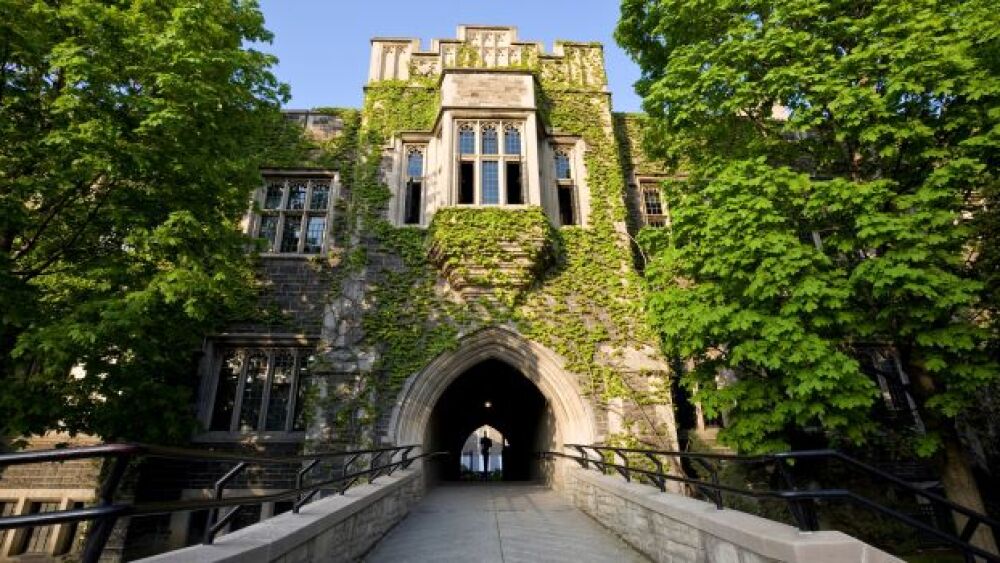The partnership framework agreement allows Moderna and U of T to collaborate across a broad variety of areas, ranging from molecular genetics to biomedical engineering, biochemistry and more.
Hart House, University of Toronto/courtesy of Getty Images
Moderna is on a roll. On Thursday, the company announced it was partnering with the nonprofit scientific research organization IAVI. Earlier in the week, the University of Toronto reported it was partnering with the mRNA specialist.
U of T and Moderna have a partnership framework agreement that allows the two organizations to collaborate across a broad variety of areas, ranging from molecular genetics to biomedical engineering, biochemistry and more. This is the first research partnership Moderna has struck with a Canadian university.
“Today we are delighted to announce that Moderna is partnering with U of T, and is keen to do so because Moderna recognizes that there is nowhere else in the world where you can find expertise at scale like you can at U of T,” said Leah Cowen, U of T’s vice president, research and innovation and strategic initiatives. “It is not every day that an opportunity presents to combine a world-class life sciences research community and a disruptive biological innovator. We are proud to say that today is one such day.”
Moderna’s country general manager in Canada, Patricia Gauthier, indicated the company is looking forward to leveraging U of T’s interdisciplinary expertise to advance shared interests in medical research.
“At Moderna, we have several different modalities that we’re working towards,” Gauthier said. “We’ve proven our approach works with infectious diseases, so there’s a really big focus on that - but I think we can also go way beyond.”
The partnership with IAVI is to develop therapeutics and vaccines against global health threats, such as HIV/AIDS, TB, COVID-19 and antimicrobial-resistant enteric infections. The Moderna-IAVI partnership really started in January when a clinical trial launched at George Washington University (GWU) School of Medicine and Health Sciences to evaluate sequential dosing of priming and boosting HIV immunogens delivered by way of mRNA to determine if it can stimulate B-cell responses and hopefully them into broadly neutralizing antibodies. That trial is funded by the Bill & Melinda Gates Foundation.
Moderna is no stranger to strategic collaborations. It lists partnerships with AstraZeneca, Merck, Vertex, the Biomedical Advanced Research and Development Authority (BARDA), the Defense Advanced Research Projects Agency (DARPA), the Gates Foundation as mentioned earlier, the Karolinska Institute and Karolinska University Hospital and Institut Pasteur.
On April 4, Moderna launched the Moderna Charitable Foundation “to promote public health, access to quality healthcare and educational opportunities, particularly in underserved populations.”
The foundation was established by the company’s board of directors, which granted an initial upfront endowment of $50 million. The Foundation and the grant program will look at charitable programs with a particular focus on local and global communities impacted by the pandemic, supporting scientific education and innovation, public health and access to healthcare and pushing for inclusion and diversity.
Starting out, the Foundation announced about $5 million in initial grants to five local and global nonprofits. They included:
• Boston Medical Center’s Good Grief Program. This program focuses on therapeutic services for children who have experienced a loss.
• Heading Home. Based in Cambridge, Mass., this organization provides permanent, supportive housing for extremely low-income people.
• International Rescue Committee. Supports infection prevention and control programs in West and Central Africa, especially in conflict zones.
• Life Sciences Cares. Supports nonprofit partnerships and programs that fight poverty in the Greater Boston Area.
• Year Up. A workforce development program that “closes the opportunity divide between young adults and companies across the U.S.”
Stéphane Bancel, chief executive officer of Moderna, stated, “The Moderna Foundation is an extension of the positive societal impact we have made following the development of our COVID-19 vaccine and reflects our continued commitment to communities impacted by COVID-19. We are excited to extend our social impact and support the causes our employees care most about as we work relentlessly to improve human health with our mRNA technology.”
Featured Jobs on BioSpace





